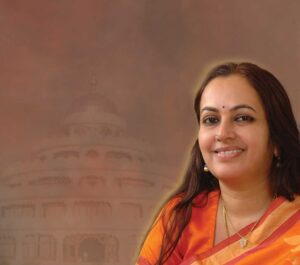BHANUMATHI NARASIMHAN
 Shiva is beauty, benevolence, and truth. To understand Shiva you have to understand the creation — but can you ever fathom it? Sri Sri Ravi Shankar says, “One who is not amazed by the magnificence of this creation, his eyes are not yet open. Once your eyes open, they close and this is called meditation. ” It takes you to the space of Shiva Tattva. There are three types of space — the Bhutakash, Chittakash and Chidakash.
Shiva is beauty, benevolence, and truth. To understand Shiva you have to understand the creation — but can you ever fathom it? Sri Sri Ravi Shankar says, “One who is not amazed by the magnificence of this creation, his eyes are not yet open. Once your eyes open, they close and this is called meditation. ” It takes you to the space of Shiva Tattva. There are three types of space — the Bhutakash, Chittakash and Chidakash.
The Bhutakash is the physical space in which all matter exists.
The universe is made up of the five elements: earth, water, fire, air and ether. When we chant Om Namah Shivaya, we essentially honour these five elements that make up the whole creation. The five elements are the Shiva principle itself in the Bhutakash and are all-pervading in the physical space. Shiva is the non-judgemental, all-accepting innocence and is called ‘Bholenath’ or the ‘innocent Lord’. For example, the Ganga accepts flowers that you offer and also the garbage that is thrown in it.
There is no judgement. The river remains true to its nature irrespective of circumstances. Being in your nature is being in the Shiva Tattva. However, for the water to be useful, it needs to be kept clean and unpolluted. Here, we have to use our intellect to understand what is useful and what is not. The mind, intellect, and memory belong to the second type of space — Chittakash. This is the intermediate or inner space, where all thoughts and emotions float about. This is not a physical measurable space.
We do not say we need two square metres of space for our thoughts. Yet it can fill our mind completely. The mind oscillates between the past and future, likes and dislikes; the intellect is caught between good and bad, right and wrong judgements. Our ancient seers attributed challenging circumstances that come up in the life and mind of an individual, to the impact of the grahas, planets. Once again, chanting Om Namah Shivaya takes care of malefic effects as Shiva is said to rule over all the planets.
Tandav, the dance of Shiva, is when the whole creation is dancing. Sometimes, it is Rudra Tandav when there are floods, earthquakes and volcanoes erupting. On the other hand, there is snowfall or the spring with all its beautiful flowers, chirping birds and rainbows. And when the showers happen and water is cascading everywhere, it looks like nature is brimming with love; with an urge to quench the thirst of the parched earth. There is so much love, caring and sharing in nature. It is an expression of Shiva’s Ananda Tandav.
Divinity expresses itself through creation. Broaden your vision and you can only see creation and the Creator — it is His play. The human mind is also part of creation and has the ability to gain insight into divinity; who we are and why we have come here. All insights happen in the Chittakash. Beyond the Chittakash is the Chidakash. This is the space of pure consciousness or energy. The Bhutakash and the Chittakash are attributes of creation, while the Chidakash is the Creator. Here Gurudev says, “The dancer and the dance cannot be separated, so also the creator and his creation.
” To be established in this space, a Guru is essential. To move beyond the Chittakash, one needs to transcend the ego. It is what prevents you from experiencing the Shiva Tattva within. Innocence and naturalness are antidotes to the ego. Break the ego and you are in the space of Shiva. For example, there is water in a bottle and the same water also flows in the Ganges. The bottle is limited but the Ganges is not. Our body is like the bottle. It gives us limited identity. Once we realise this, we enter the space of divinity, which is indescribable.
As Gurudev says, “You can never meet God. For when you meet God, you dissolve, only God remains. ”







